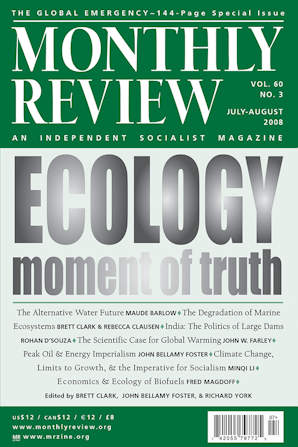Also in this issue
- Peak Oil and Energy Imperialism
- The Scientific Case for Modern Anthropogenic Global Warming
- The Political Economy and Ecology of Biofuels
- Climate Change, Limits to Growth, and the Imperative for Socialism
- The Oceanic Crisis: Capitalism and the Degradation of Marine Ecosystem
- Framing India's Hydraulic Crisis: The Politics of the Modern Large Dam
- Blue Covenant: The Alternative Water Future

